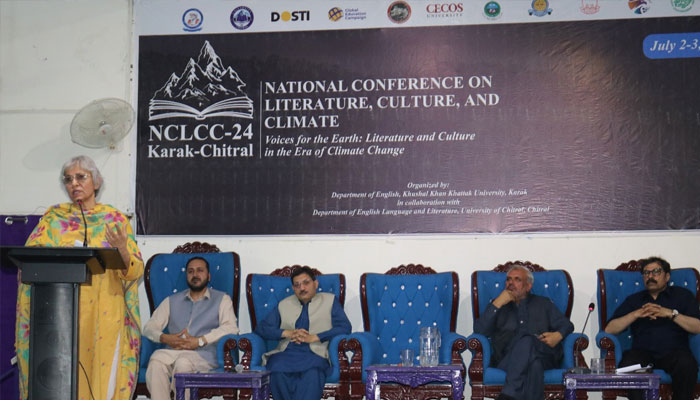Academic institutions role in addressing climate change issue stressed
CHITRAL: Speakers at the conference emphasized the role of academic institutions in addressing climate change issues not only through research and innovation but also by fostering a culture of environmental stewardship among students and faculty.
The national conference on literature, culture, and climate was hosted in the serene valley of Chitral. It was titled “Voices for the Earth: Literature and Culture in the Era of Climate Change.”
It was a collaboration between the Department of English, Khushal Khan Khattak University, Karak, and the Department of English Language & Literature, University of Chitral.
The organizers said the conference was more than a mere gathering of scholars. They said it was dedicated to addressing one of the most pressing issues of the time: climate challenges, through the lens of literature and culture.
The conference fostered the collaborative spirit and academic pursuit to address the climate challenges, and to spread awareness about the issues in the very endangered region. Dr Syed Hanif Rasool Kakakhel, head of the department of English, Khushal Khan Khattak University, Karak, was the organizer who moderated the proceedings.
The moot evolved into a platform where literature, culture, and climate change intersected in profound and unexpected ways.The event was supported by DOSTI Welfare Organization, CECOS University, Peshawar, Higher Education Department, Khyber Pakhtunkhwa, Directorate of Youth Affairs, Khyber Pakhtunkhwa, Department of Wildlife Chitral, Government Girls Degree College Chitral, Government Degree College Chitral, Government College of Management Sciences Chitral, and the Pakistan Academy of Letters.
Co-organizer of the conference, Dr Kifayatullah, head of the Department of English Language and Literature at the University of Chitral, welcomed the speakers, presenters, and participants.
Chair of the conference, Prof Dr Abdus Salam Khalis, a former dean of Arts and languages and former Chairman Department of English, Islamia College, Peshawar opened the conference.Dr Khalis emphasized the need for interdisciplinary approaches to combat climate challenges, drawing inferences from the world literature. His words set the stage for a series of impactful discussions.
Dr. Syed Hanif Rasool Kakakhel called for uniting scholars, researchers, and students of literary and cultural studies to explore how contemporary literary and cultural texts grapple with the multifaceted challenges posed by anthropogenic climate change, marking the beginning of a grand climate pledge.
Emphasizing the contributions of the humanities in addressing the problem of climate change, Dr, Kakakhel underscored how literature and culture serve as mediums for grappling with the multifaceted dimensions of climate change, including its representation, ethical implications, and existential ramifications.
Dr. Najeeba Arif, Chairperson of the Pakistan Academy of Letters, as special guest underscored the broader cultural and intellectual significance of the conference. She appreciated the entire team of the conference for their efforts in making the event a success.
Addresses by Dr. Khalid Khan the symbiotic relationship between literature and environmental consciousness offered new perspectives on how narratives can drive ecological awareness.Dr. Osama Siddique highlighted the pivotal role of cultural narratives in shaping public perception and policy.
Prof. Dr. Muhammad Naseer Ud Din, the vice-chancellor of Khushal Khan Khattak University, Karak, emphasized the role of academic institutions in addressing climate change, not only through research and innovation but also by fostering a culture of environmental stewardship among students and faculty.
Dr. Sana Ullah, head Department of Sociology, University of Chitral, distributed the certificates and souvenirs among the presenters, participants, and distinguished guests respectively.The conference featured an extensive programme, including 12 parallel sessions with around 80 participants presenting their research and insights.
-
 Mexico’s President Considers Legal Action Over Elon Musk Cartel Remark
Mexico’s President Considers Legal Action Over Elon Musk Cartel Remark -
 Prince William Hits The Roof With The Andrew Saga Bleeding Into Earthshot
Prince William Hits The Roof With The Andrew Saga Bleeding Into Earthshot -
 HBO Gives Major Update About 'Industry' Season Five And Show's End
HBO Gives Major Update About 'Industry' Season Five And Show's End -
 Donnie Wahlberg Responds To 'Boston Blue' Backlash: 'Nobody Was More Disappointed Than Me'
Donnie Wahlberg Responds To 'Boston Blue' Backlash: 'Nobody Was More Disappointed Than Me' -
 Jennifer Garner Gets Emotional Over Humble Career Start: 'It Makes Me Want To Cry'
Jennifer Garner Gets Emotional Over Humble Career Start: 'It Makes Me Want To Cry' -
 Princess Beatrice Told An Acquaintance That She ‘likes’ Jeffrey Epstein: Grim Verdict Drops
Princess Beatrice Told An Acquaintance That She ‘likes’ Jeffrey Epstein: Grim Verdict Drops -
 Late Katherine Short's Neighbours Give Insights Into Her 'peace Loving' Personality Post Suicide
Late Katherine Short's Neighbours Give Insights Into Her 'peace Loving' Personality Post Suicide -
 Fresh Details Of King Charles, Queen Camilla's US Visit Emerge Amid Andrew Investigation
Fresh Details Of King Charles, Queen Camilla's US Visit Emerge Amid Andrew Investigation -
 Iran 'set To Buy' Chinese Carrier-killer Missiles As US Forces Gather In Region
Iran 'set To Buy' Chinese Carrier-killer Missiles As US Forces Gather In Region -
 Prince Harry And Meghan Unlikely To Meet Royals In Jordan
Prince Harry And Meghan Unlikely To Meet Royals In Jordan -
 Hero Fiennes Tiffin Shares Life-changing Advice He Received From Henry Cavill
Hero Fiennes Tiffin Shares Life-changing Advice He Received From Henry Cavill -
 Savannah Guthrie's Fans Receive Disappointing News
Savannah Guthrie's Fans Receive Disappointing News -
 Prince William Steps Out For First Solo Outing After Andrew's Arrest
Prince William Steps Out For First Solo Outing After Andrew's Arrest -
 Jake Paul Chooses Silence As Van Damme Once Again Challenges Him To Fight
Jake Paul Chooses Silence As Van Damme Once Again Challenges Him To Fight -
 Google Disrupts Chinese-linked Hacking Groups Behind Global Cyber Attacks
Google Disrupts Chinese-linked Hacking Groups Behind Global Cyber Attacks -
 Four People Killed In Stabbing Rampage At Washington Home
Four People Killed In Stabbing Rampage At Washington Home




